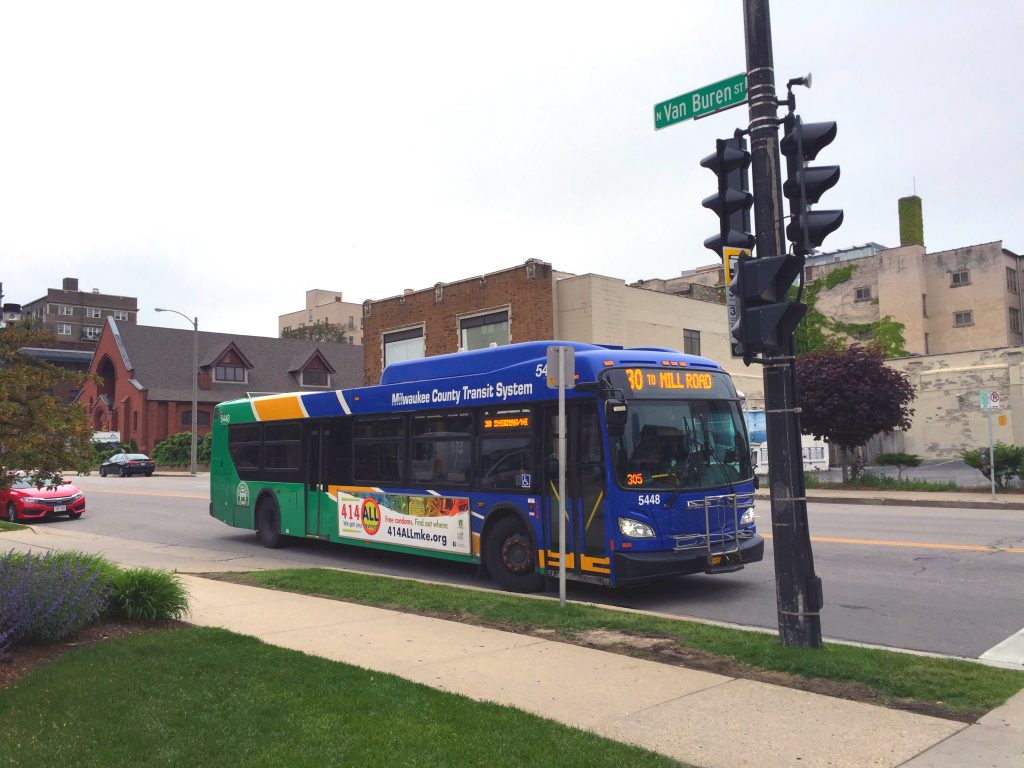Why the Bus Union Didn’t Strike
MCTS offer of back pay for workers, and weariness after 21 months bargaining, were key.
The Milwaukee County Transit System (MCTS) and the union representing transit workers have finally approved a contract, but the issues separating both groups are far from settled.
It took nearly two years for the Amalgamated Transit Union and MCTS to negotiate the contract. Negotiations were often tense, and at times boiled over into public view. In the last four months of negotiations, the union managed to pull some major concessions out of the transit company: it blocked the transit company’s push to require employee payment of co-insurance for healthcare while also securing raises and cost-of-living adjustments for workers. The union was running out of tools, and twice threatened to strike.
But the key to resolving the contract dispute was an offer of back pay from the company, which took the form of a bonus. Workers that were with the company before negotiations began will get $800 with a decreasing amount for workers that have not been with the company as long.
One MCTS official said the back pay offer was the deciding factor, and that if union president James Macon hadn’t backed off his attacks on the proposal to union membership, the contract vote last Friday might have gone the other way.
Boehm said the three year contract includes salary increases, signing bonuses and a generous healthcare plan. Boehm also said, “We encourage anyone who supports transit to speak up on the need for a long-term funding solution.”
This is the rub. Milwaukee County was originally looking at a historic transit budget deficit for 2019. In August estimates had it as high as approximately $8 million. In order to balance the budget there were plans to cut 16 routes. But actions by the County Executive Chris Abele and the County Board saved a majority of those routes. But in order to pay for the bonuses, the transit system had to run a deficit for 2019.
Macon said that after 21 months of negotiations, the union was split. The final offer with the raises and bonus seemed to many like the best contract the union could hope for at this stage. After the bonus, he said, the only members of the executive board pushing for more were himself and VP Michael Bautch. The holidays are coming up, Macon noted, and the little pay raise they received always helps. “The board was looking at the money, and not the future,” Macon said.
He still feels that the contract fails to address the union’s long term concerns about the direction of transit in Milwaukee County. He said the profession of bus driving in Milwaukee County will continue to be a revolving door, not paying the way it once did. Bus routes, despite efforts by Abele and the board, continue to decline. And security, perhaps the most pressing day-to-day issue for operators, was not addressed.
The cash in hand was too hard to pass up. “We are too divided and I don’t want to take people on the street when we have a divided union,” Macon said.
The union last struck in 2015 and Macon was president then, too. Had he been newer to the job now as he was then, Macon said, he may have called for a strike this time. “This time I tried to think it through and do what was best for the public and best for the members.”
Now that negotiations are over, Macon wonders if the county would have addressed security in this contract if he had pressed harder for it.“They thought my proposal was ridiculous. It wasn’t ridiculous,” he said.
After he announced his proposal in May, the media’s fleeting attention was drawn to the issue of security on Milwaukee County buses. Macon said support started flooding in from gun advocacy groups around the country. If he had stayed the course, he wonders if he could have forced MCTS into a security proposal.
For its part, MCTS has committed to a work group in the coming year, to include operators and ATU members, to look into options for security on the bus.
One question on the union’s mind, as it is many in Milwaukee County government, is who will be the next County Executive. Macon said the union will be involved in advocating for transit issues with candidates, and will eventually endorse someone. He said the campaigns of Bryan Kennedy and David Crowley have already reached out.
“One thing we gotta do is we gotta bring a county exec. in here that cares about transportation,” Macon said.
If you think stories like this are important, become a member of Urban Milwaukee and help support real, independent journalism. Plus you get some cool added benefits.
Political Contributions Tracker
Displaying political contributions between people mentioned in this story. Learn more.
- June 30, 2016 - David Crowley received $1,000 from Chris Abele
- June 27, 2016 - David Crowley received $50 from Bryan Kennedy
Transportation
-
Congestion Pricing Cuts Air Pollution in New York City
 Dec 14th, 2025 by Jeff Wood
Dec 14th, 2025 by Jeff Wood
-
FTA Tells Milwaukee to Crack Down on Fare Evasion — Even Where Fares Don’t Exist
 Dec 12th, 2025 by Graham Kilmer
Dec 12th, 2025 by Graham Kilmer
-
Will GOGO’s Bus Service Ever Get Going?
 Dec 9th, 2025 by Jeramey Jannene
Dec 9th, 2025 by Jeramey Jannene






















